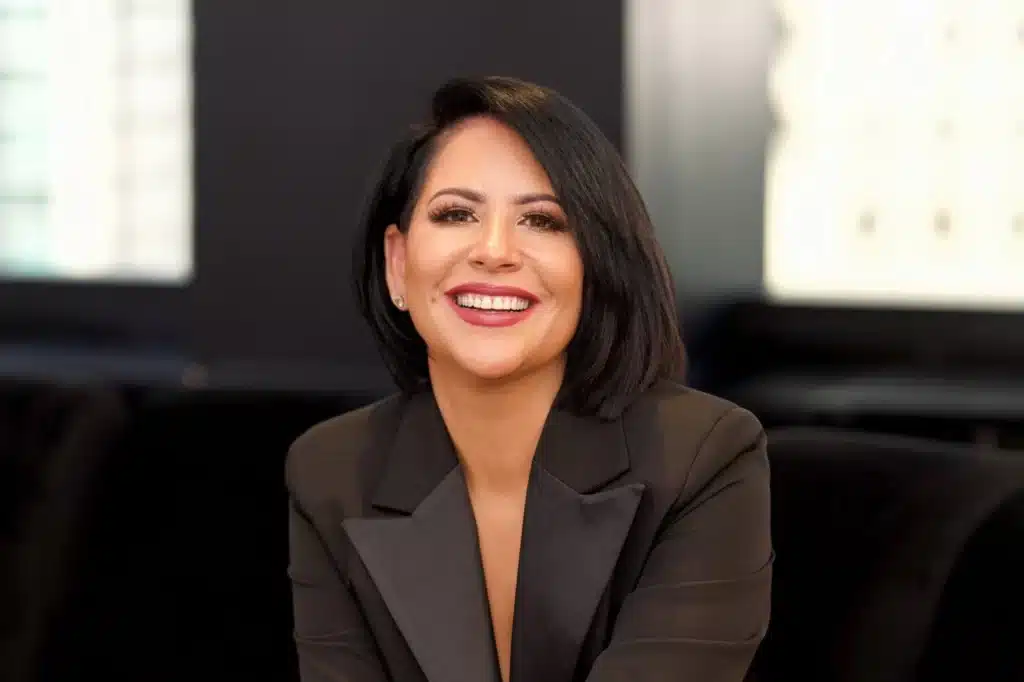
Five Latinas in the C-Suite on Redefining Leadership in Spaces Not Built for Them
Early in my career, I carried an unspoken weight into every meeting: the need to prove I was unshakable. Power, I believed, meant having the sharpest answers, never revealing doubt, and working twice as hard just to be seen as capable. But holding that armor was exhausting.
The turning point came when, instead of trying to command the room, I chose to invite others in. To my surprise, that moment of vulnerability deepened the trust around me. For the first time, I realized power wasn’t about being untouchable. It was about being human.
Today, women of color in C-suites show us that power doesn’t have to mean hierarchy or assimilation. It can mean impact, integrity, and purpose.
However, the very systems these leaders are reshaping often fail to sustain their influence
McKinsey & Company reports that women of color are underrepresented at every level of leadership, representing only 7 percent of current C-suite positions. Latinas make up just 1 percent of executives, according to Lean In.
For women of color in leadership, their journeys illustrate what the numbers alone cannot. That’s why I spoke with five Latina women who are leading this shift: Jessica Santana, CEO at America On Tech; Daisy Auger-Domínguez, Fractional Chief People Officer and Executive Advisor; Vanessa Santos, former CEO & Partner of #WeAllGrow Latina; Vivian Delgado-Johnson, Founder & President at Vivid Strategies Consulting; and Anna Dapelo-Garcia, Founder & President of Lean In Latinas.
Their stories also come at a time of contradiction: companies are rolling back DEI programs, leaders of color are disparaged as “diversity hires,” and immigration policies grow harsher. It’s a paradox where we see less institutional support, yet a growing expectation for leaders to build and nurture inclusive workplaces.
And still, these leaders rise, refusing to conform to outdated molds of authority and showing us that leadership can be more human and more courageous.
The women we spoke with are reshaping what power looks like, on their terms. We spotlight five remarkable leaders about their roles, their journeys, and the strategies they’ve used to redefine leadership in spaces that weren’t built with them in mind.

How Latinas in the C-Suite are redefining power through authenticity and purpose
The world has long measured power in titles, corner offices, and control. But for these Latinas in the C-suite, power doesn’t equate to holding tight to authority. They define power around what you create, share, and unlock for others.
For Jessica Santana, CEO at America On Tech, real power is less about accumulation and more about circulation. “What are the things that are centralized within me that I can actually decentralize and actually put back on communities to actually empower themselves?” She asks herself.
That shift, from control to generosity, defines how she leads.
Daisy Auger-Domínguez, Fractional Chief People Officer and Executive Advisor, had a similar realization. Early in her career, she believed power was about access to rooms and titles. Today, she measures it by what she does with that access: how she directs it, stores it, and uses it to open doors for others.
Vivian Delgado-Johnson, Founder & President at Vivid Strategies Consulting, shares that her journey illustrates just how hard-won this reframing can be. For years, she equated power with composure and never letting anyone see you sweat. She kept her femininity and Puerto Rican heritage quiet so she could fit an image of leadership.
But over time, she realized those very things she muted were the source of her strength. “What makes me different and what makes me who I am is what makes me powerful,” Vivian says.
For each of these women, authenticity is the ground on which they’ve rebuilt power itself.

The truth about leading in systems that weren’t built for us
Similarly, the world never designed the corporate ladder with women of color in mind. Stepping into leadership often means carrying the weight of stereotypes, expectations, and unspoken rules.
Daisy remembers the years she spent in “prove-it mode,” pouring energy into convincing others she belonged. The constant need for credibility, she says, was exhausting.
Vanessa Santos, former CEO & Partner of #WeAllGrow Latina, says she splintered herself into fragments to survive. “I was breaking myself up into a whole bunch of little pieces to be digestible to fit in, be palatable, so that I can access and enter spaces,” she says.
Code-switching became second nature until she realized that her wins came not despite who she was, but because of it. “The deals closed because of who I am,” she says, “not despite it.”
For Anna Dapelo-Garcia, Founder & President of Lean In Latinas, the silencing came even earlier. Her father, who she says was subjected to racism in the ’50s, warned her to keep her head down and not cause trouble. This left her with the belief that she was lucky to be in the room at all.
“It took me a long time to speak up for myself,” Anna says. “Now, I’d tell other women, ‘don’t be afraid to speak up and do it respectfully.’”
These reflections reveal not just the weight of leading in systems never built with them in mind, but also the resilience it takes to resist assimilation and lead authentically.

How to embrace the power of truly being seen
Recognition is rare when your contributions are often overlooked or minimized. But being truly seen for your talent, strategy, or vision can transform how you lead.
Jessica recalls a moment when her board and cofounder recognized her commitment rather than just her output. Exhausted but still pushing forward, she was met with grace.
“I was afraid that my passion would be mistaken for aggression,” she says. “What I was fighting for in that meeting was coming from a place of deep pain. It was coming from a place of deep frustration, and in that moment, I felt really understood by my team, who completely validated my feelings.”
That acknowledgment was proof that being seen can mean being valued for more than productivity.
Daisy experienced validation differently: when her CEO publicly connected her DEI work to business outcomes. In that moment, her contributions affirmed leadership’s impact on the company’s success.
“Many of us sometimes think it’s just all about the business, or all about the people,” Daisy says. “But it’s about that magic connection of the two, because you are in service of both.”

How Latinas in the C-Suite stay grounded under relentless pressure
Leadership comes with pressure, and for women of color, that pressure can feel heightened by external scrutiny. To lead sustainably, staying grounded is survival.
Vivian roots herself in faith and a survivor’s mindset. “I allow myself now to celebrate me, to celebrate others, without expectations,” she says.
Anna emphasizes centering herself on impact, even amid political setbacks and noise. Whether it’s through small rituals like handwritten postcards at her conference or focusing on the real difference her work makes, she finds grounding in purpose.
“Even if it’s just one person we’re making a difference for, I’m good with that,” she says. “In order for me to keep doing this work, I center myself on what our members need, and creating spaces where we can continue to be loud and proud.”
For Jessica, staying grounded means nurturing the relationships more deeply with the people who care. She reinforces this through rituals, where Sundays are sacred appreciation days, during which she spends the day resting, connecting with her family, and preparing for the week ahead. This helps her lead from a place of wholeness rather than depletion.
Their practices differ, but the lesson is the same: grounding is the key to sustaining leadership under constant watch.

Using leadership to advocate and open doors for others
Holding a seat at the table comes with responsibility, and for these Latinas, leadership is advocacy. They use their voices to make space for those who aren’t yet heard, understanding that influence means little if it isn’t used to open doors and shift systems.
Vanessa says it’s easy to make advocacy look performative, so she’s speaking directly to the people in power.
“My form of advocacy is putting myself in situations and environments where I know nobody that looks like me or came from, and having conversations honestly about how detrimental it will be if these organizations or businesses continue to operate in the way that they’re operating.”
Vivian is advocating for women to build their own tables rather than fight for scraps of space at someone else’s. “Step into a room, own that room,” she insists. “What you bring is something different, nobody else can replicate.”
For these women, advocacy isn’t a separate task from leadership. It is leadership.
What Latinas in the C-Suite want the next generation to know
Legacy is measured not just in accomplishments, but in the pathways cleared for those who follow. These leaders carry a deep sense of responsibility to the next generation, and their words are reminders that leadership is both a calling and a gift to be passed on.
Anna is clear-eyed about legacy. She knows she may not see the day when the number of Latinas in the C-suite shifts from 1 percent to double digits, but she still wants to be part of the women today who make it possible for those tomorrow.
Her advice to rising leaders is simple: don’t let your identity get tied to your title, because titles can disappear. “Be equitable in how you treat people regardless of whether they have a C-suite title or not,” she says.
For Daisy, the lesson is about courage. “Clarity doesn’t come before the leap, it comes after,” she says. “Don’t wait for permission, claim the seat, stand up when needed and safe for you, and pull up more chairs.”
Vivian says vulnerability is not a weakness but a strength, and being different is not something to hide but to celebrate.
“I was shying away from my history, my beginnings, my roots. And as I evolve, I think that vulnerability is okay. People respect you more when you show up authentically,” she says.
The future of leadership is being rewritten
Each of these women reminds us that leadership is a living, evolving practice shaped by values, vision, and courage. They are proof that true leadership demands presence and the willingness to shape systems, rather than being shaped by them.
As we consider the future of leadership, their journeys signal a shift: power is no longer about fitting a mold, accumulating titles, or asserting control. It’s about creating impact, opening doors, and leading with courage.
If we pay attention, we’ll see that the women shaping the C-suite today are redefining the system from within.




